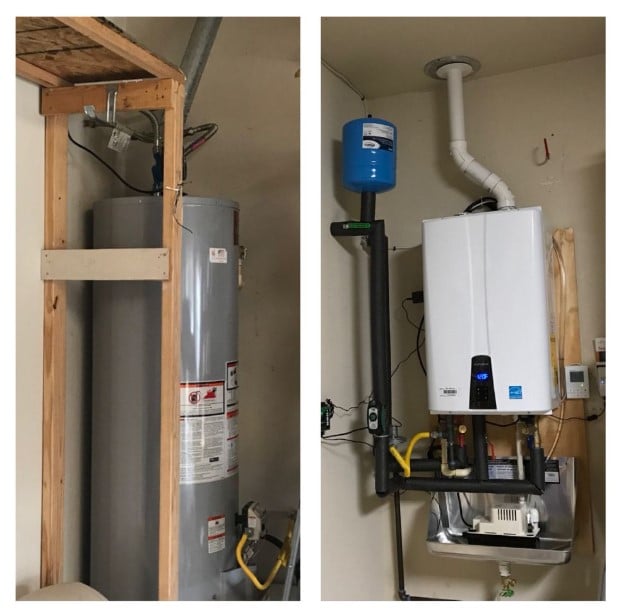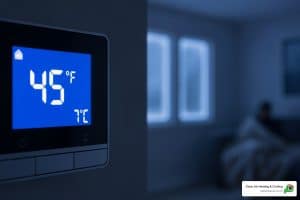Tankless water heaters are becoming more popular each year. Homeowners are beginning to realize the benefits of tankless water heaters and are switching from tank-style units. But which one is right for your home? Which is the best option for cost, efficiency, lifespan, and servicing? Let’s look at tank versus tankless water heaters to help you decide.
What Is a Tank Water Heater?
A tank water heater is a great way to provide hot water to your home or business. This type of water heater uses either electric elements or natural gas coils to heat water in an insulated storage tank. The tank is usually made from sturdy steel or cast iron and is designed for long-term use.
Once the water has been heated, it can be used for showers, washing dishes, and other activities that require hot water.
While tank water heaters typically require less maintenance than tankless models, they require periodic flushing to reduce sediment buildup and maximize efficiency.
Over the years, tank-based water heaters have become more energy-efficient. This is due to new technology and insulation materials that allow tank water heaters to keep the tank at a consistent temperature over an extended period.
What Is a Tankless Water Heater?
A tankless water heater is a space-saving, energy-efficient way to heat your home’s hot water. Unlike traditional tank water heaters, tankless systems don’t store a large volume of hot water, requiring less energy to keep that hot water circulating.
Tankless systems heat the water as you use it, and they can provide an endless supply of hot water since they never run out. Another advantage of having a tankless system is that it generally lasts much longer than a typical one, saving you money on upkeep and repair costs over time.
Tankless systems also come in various sizes, so you can choose one that fits your household needs and budget.
Differences Between Tank and Tankless Water Heaters
Assessing whether a tankless or tank-style water heater is right for your home? Here are six key points to help you choose.
1. Price
Tankless water heaters often have a higher initial cost than tank models but offer plenty of potential savings due to their lower operating costs and increased lifespan.
While installation of tankless systems is often more expensive than tank models, tankless may cost you less in the long run. They provide hot water only when needed, as opposed to running constantly to maintain a hot reserve of liquid as a tank system does.
2. Efficiency
The efficiency of tank water heaters is lower than tankless ones due to how they continuously cycle to keep hot water available. As the water runs through a tank water heater, the heat it holds decreases, meaning that the heater must continuously warm the same water repeatedly. This constant reheating process can cause energy costs to rise, making a tankless option more efficient for those needing consistent hot water access.
Tankless systems do not require cycling and only heat up when needed, making them much more energy-efficient than traditional tank-based models.
3. Lifespan
Since hot water is an integral part of almost any regular day, choosing between traditional tank-style water heaters and tankless systems can be challenging.
As you consider your options, it’s essential to consider the lifespan of each system and how best to ensure long-term operation. Traditional tank-style water heaters typically last anywhere from 8 to 15 years, while more modern tankless systems are designed to last longer — up to 20 years with proper maintenance.
If you are on top of maintenance and repairs, tank water heaters may be your best choice. But tankless systems can be the way to go if you prefer something more reliable over time.
4. Amount of Water Used
With their ability to provide hot water on demand, tankless systems only consume what is necessary when it is needed. This is beneficial from a savings perspective and an environmental standpoint, as less water is being used.
Since tank-based water heaters must always have hot water available, they consume more energy and are not as efficient.
Of course, tankless systems don’t have the same capacity as tank models, so if you need a lot of hot water at once, tank-based may be your best bet.
5. Servicing
While standard tank-style water heaters need frequent inspection and repairs to ensure they’re working correctly, tankless water heaters are relatively hassle-free.
They are much simpler machines that require less upkeep due to their smaller size and all-in-one unit design. Servicing a tankless water heater can often be done using preventative measures like flushing out the system or replacing worn parts.
Some models even come with features like self-diagnostics which can alert the user if a problem is detected.
6. Capacity of Hot Water
If you have a large household or a lot of simultaneous hot water needs, tank-style water heaters may be your best bet. This is because tankless systems typically cannot provide as much hot water at once as tank models and thus require more planning ahead when it comes to usage.
Tank-style units can provide up to 30-80 gallons of hot water at a time, while tankless models have a limited capacity of 2-5 gallons per minute.
Tank-style units may be more convenient for a family with multiple hot water needs as they can simultaneously provide more significant amounts of hot water for various uses.
Conclusion
If you don’t know whether a tank or tankless water heater system would be better for your home, that’s understandable. Both systems have benefits and drawbacks that are important to consider before making a decision.
Your needs and preferences significantly influence what kind of water heater will work best for you. If you’re still unsure after reading this, Clean Air is happy to help out! We’re a heating and air conditioning company serving Bellingham with experts who can answer all kinds of questions about HVAC systems.
Reach out today; we’d love to chat with you!
Frequently Asked Questions on Tank and Tankless Water Heaters
Are you still confused about tank and tankless water heaters? Here are some of the frequently asked questions about these systems to help you decide which one is best for your home.
1. What kind of water heater is right for my home?
When selecting the right water heater for your home, it is vital to consider a variety of factors, especially the size of your household and your hot water needs.
Tank-style models may be the best choice if you require efficient simultaneous hot water usage and larger capacity. On the other hand, if you want something more energy efficient that also heats water quickly, tankless units are a better option for you.
Before making any purchase, consider all factors to ensure you receive the best value.
2. How will I know if my water heater needs to be repaired or replaced?
Tank-style water heaters should be inspected and serviced regularly to maintain their efficiency. Common signs that your tank-style unit may need repairs include strange noises, decreased hot water availability, and higher energy bills due to inefficient operation.
For tankless systems, you may encounter similar signs or others, such as fluctuating water temperatures or hot water that doesn’t last long. If you notice any of these issues with your tankless system, contact a professional immediately to inspect and address the issue.
3. Are there three types of tankless water heaters? What are the differences?
Tankless water heaters are becoming increasingly popular due to their efficient, cost-effective operation. However, many need to learn that three different tankless water heaters are on the market.
- Condensing: Condensing tankless water heaters are a more efficient option because they have multiple heat exchangers.
- Non-condensing: Non-condensing tankless water heaters utilize a heat exchanger to heat water as needed. Hot exhaust from the tankless unit must be released outside of the home.
- Hybrid: Hybrid tankless water heaters are a combination of tank and tankless styles that offer both systems’ benefits. They usually have small tanks and require an open space for venting.
Your budget, hot water needs, and household size will ultimately determine which tankless system is right for you.
4. How do I prolong the life of my water heater?
It’s essential to keep your water heater in excellent shape to achieve the longest lifespan. It is recommended to inspect and service your water heater once a year. This maintenance can help avoid future damage, prolong your unit’s life, and even reduce energy costs — a win-win for everyone!
Be sure to flush the unit’s sediment trap every so often — this is especially true for tank styles, as sludge can accumulate in the bottom over time.
Additionally, the area around the water heater must remain clean, not cluttered, and free from dust build-up that could interfere with its functionality.
The same goes for a tankless system. Regularly inspect and clean the unit’s heat exchangers to maximize their performance and lifespan.





